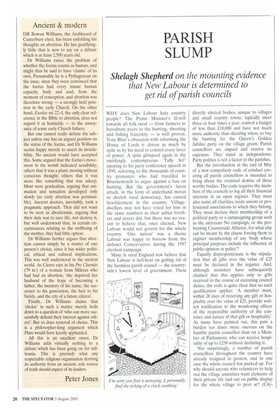Ancient & modern
DR Rowan Williams, the Archbeard of Canterbury elect, has been unfolding his thoughts on abortion. He has gratifyingly little that is new to say on a debate which is at least 2,500 years old.
Dr Williams raises the problem of whether the foetus counts as human, and might thus be said to have 'claims' of its own. Presumably he is a Pythagorean on the issue, since they were convinced that the foetus had every innate human capacity, body and soul, from the moment of conception, and abortion was therefore wrong — a strongly held position in the early Church. On the other hand, Exodus xxi 22-4, the only clear reference in the Bible to abortion, does not regard it as homicide — to the annoyance of some early Church fathers.
But one cannot really debate the subject unless one has an argued position on the status of the foetus, and Dr Williams seems happy merely to assert its inviolability. No ancient would have accepted this. Some argued that the foetus's movement in the womb indicated sensibility; others that it was a plant, moving without conscious thought; others that it was more like something that was asleep. Most were gradualists, arguing that animation and sensation developed only slowly (so early abortion was permissible). Ancient doctors, inevitably, took a pragmatic approach. They did not want to be seen as abortionists, arguing that their duty was to save life, not destroy it, but well understood that, in certain circumstances relating to the wellbeing of the mother, they had little option.
Dr Williams further argues that abortion cannot simply be a matter of one person's choice, since it has wider political, ethical and cultural implications. This was well understood in the ancient world. As Cicero says in his Pm Cluentio (79 Bc) of a woman from Miletus who had had an abortion, 'she deprived her husband of the hope of becoming a father, the memory of his name, the successor to his generation, the heir to his family, and the city of a future citizen'.
Finally, Dr Williams claims that 'choice' in such a matter merely boils down to a question of 'who can more successfully defend their interest against others'. But so does removal of choice. This is a philosopher-king argument which Plato would have keenly applauded.
All this is an excellent omen. Dr Williams adds virtually nothing to a debate which has been going on for millennia. This is precisely what any respectable religious organisation deriving its authority from an ancient, sole source of truth should expect of its leaders.
Peter Jones


























































 Previous page
Previous page